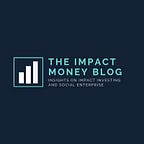Fancy That! An Industry Insider Calls Sustainable Investing a “Dangerous Placebo”
Tariq Fancy, former Chief Investment Officer for Sustainable Investing at BlackRock, the world’s largest investment firm, who led the company’s effort to incorporate ESG factors across all investment activities, recently published a three part essay called “ The Secret Diary of a ‘Sustainable Investor’ “ in which he details his journey from ESG investment evangelist to one of its sharpest critics.
I would encourage everyone to read the essays, but what I find most remarkable about them is that the criticisms, none of which are particularly new, are coming from an industry insider.
In sum, Fancy suggests ESG investing is more of a marketing gimmick than a serious tool for achieving positive social or environmental change. Divestment, on which ESG investing heavily relies, does not fundamentally alter corporate behavior or reduce carbon emissions, although Fancy worries many sustainability investors would like to believe that. The real problem, in his view, is incentives, as corporate decision-makers are focused on maximizing short-term profits, whereas making a company more sustainable might require costly investments that only achieve results in the long run. Since all companies are focused on maximizing shareholder wealth, he believes the solution to achieving real social change is government regulation, such as a carbon tax, to change corporate decision-making for the better. He likens trying to achieve real-world social impact through sustainable investing to pushing on a string, or worse, like selling wheatgrass to a cancer patient. It harms society by misleading the public and creates a dangerous distraction from other potential real-world solutions that might actually combat climate change.
I am glad that Fancy has exposed the shortcomings of ESG investing, and I broadly agree with his main conclusion. He has asked readers to forward his essays to amplify their message and spark a badly-needed public debate. I am happy to oblige. I have always been critical of those who conflate ESG or sustainable investing with impact investing, which I think is where the problem started.
As I have discussed in previous blog posts, sustainable investing and impact investing are completely unrelated. Whereas sustainable investing is a portfolio construction method that uses environmental, social and governance or “ESG” factors to screen and select publicly-listed companies for an investment fund, impact investing is about financing social enterprises, i.e. companies that are purpose-built to address the root causes of poverty and climate change in poorer countries to achieve Sustainable Development Goals. Publicly-listed companies were not built to deliver impact in the same way that social enterprises are. They exist to produce goods and services to maximize profit. Therefore, the extent to which investing in them achieves “impact” was bound to have its limitations. And yet, professional money managers almost had no choice. They responded to the recent surge in public interest in impact investing by offering investors ESG screened funds, hoping this would satisfy their desire to align their investments with their values. They did this because so few social enterprises have scaled to the point where they are publicly listed. These same money managers deliberately marketed ESG funds as “impact” investments, which further confused and misled investors. Less principled money managers even went so far as to rebrand legacy funds as ESG, leading to allegations of “ impact washing.” Impact investing industry bodies further aided and abetted this blurring of distinctions, preferring a “big tent” approach to their membership rather than taking a principled stand on what is, and what is not, impact investing.
The big fear among long-term impact investors like myself is that conflating ESG with impact investing could cause a backlash once investors realize the limited impact that ESG investing achieves. This is why Fancy’s essays are so astonishing. If the industry insiders are becoming the cynics and sharpest critics, then we may be at the cusp of this shift in investor sentiment. The concern is that if investors become disillusioned, they might revert to investing the traditional “business as usual” way, focusing only on financial returns.
While I appreciate Fancy’s criticism, I am also somewhat dismayed by the defeatist tone that ignores the fact that companies like BlackRock have enormous power to influence corporate behavior through their proxy voting. Sustainable investment fund managers should vote in favor of shareholder resolutions, for example, that increase transparency surrounding ESG related issues, or elect independent, diverse board members that can push management to focus on longer term goals and risks. Management might then feel empowered to lobby governments for a carbon tax instead of lighter environmental and labor laws. The ultimate goal of sustainable investing should be to link better ESG scores to positive corporate image. Costs associated with improving ESG scores would be justified by better brand recognition, increased customer loyalty, higher sales and perhaps even a lower cost of capital.
So we should not throw the sustainable investment baby out with the impact washing bathwater. Instead, asset owners should push money managers to take their sustainable investing mandates seriously, using the tools of good governance and shareowner engagement to change corporate behavior. In the meantime, industry insiders should distinguish sustainable investing from impact investing and be clear about what sustainable investing is, what it can achieve and what it cannot. Above all, they should stop calling it impact investing.
If you don’t have time to read Fancy’s essays, the FT distilled a good summary of his main arguments in this opinion piece entitled “ The ESG Investing Industry Is Dangerous: A BlackRock Dissident Speaks Truth”
Fancy also published his own opinion piece in USA Today, entitled “ Financial World Greenwashing the Public with Deadly Distraction in Sustainable Investing Practices,” which provides a straight-to-the-point summary of his essays.
Finally, the FT interviewed Fancy as part of a podcast entitled “ Inside ESG: Is the $1.7tn Wave of Sustainable Investing Hope or Hype? “ in which he flat out calls ESG investing “bullsh*t.”
Originally published at https://impactmoney.net on September 25, 2021.
